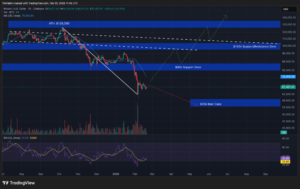Last updated:
 Why Trust Cryptonews
Why Trust Cryptonews

PayPal’s U.S. dollar-pegged stablecoin, PYUSD, has seen its supply on the Solana blockchain surpass that on Ethereum, according to recent data.
Since its expansion to Solana in May 2024, the supply of PYUSD on Solana has reached 377 million tokens, overtaking the 356 million tokens on Ethereum.
Initially launched on Ethereum in August 2023 through a partnership with Paxos, PYUSD quickly gained traction, with its supply reaching 230 million by the end of that year.
The stablecoin’s total supply has now tripled, exceeding 733 million tokens, valued at $733 million.
PYUSD’s Growth on Solana Powered by Recent Integrations
The growth of PYUSD on Solana has been fueled by its integration into decentralized exchanges like Jupiter and Orca, where PYUSD has been added to liquidity pools.
The expansion has helped PYUSD establish a significant presence on Solana, alongside leading stablecoins such as USDC and USDT.
With a market capitalization of $733 million, PayPal ranks as the fourth-largest centralized stablecoin issuer, following Tether (USDT), Circle (USDC), and First Digital (FUSD), which have market caps of $120 billion and $36 billion, respectively.
As reported, PayPal’s PYUSD stablecoin on the Solana blockchain includes a feature called “confidential transfers.”
The feature aims to provide enhanced privacy for users while maintaining transparency for regulatory purposes.
The introduction of “confidential transfers” allows merchants utilizing PYUSD to offer transactional confidentiality to their customers while still ensuring regulatory compliance.
This means that the transaction amounts can be concealed from public view, providing a level of privacy for users.
Solana Offers More Benefits For PYUSD
In addition to confidential transfers, Solana’s token extension standard, which complies with the SPL token standard, provides several benefits for PYUSD.
This includes reduced development and testing efforts, enterprise-ready capabilities that can be easily integrated, and enhanced flexibility.
The open standard of token extensions allows PYUSD to be used not only within the PayPal ecosystem but also with any compatible wallet, exchange, or library outside of PayPal.
PYUSD, launched in August 2023, is primarily backed by U.S. Treasury Reverse Repurchase Agreements, according to Paxos, the stablecoin’s issuer.
Its circulating supply has grown by 50% since the start of the year, and it currently has a 24-hour trading volume of approximately $18 million, as reported by CoinGecko.
Previously available exclusively on Ethereum, the Paxos Trust Company-issued stablecoin now has a total circulation of around $400 million, with a current supply of $5 million on the Solana blockchain, as indicated by Solana’s network explorer.
Notably, the stablecoin market, currently valued at over $140 billion, remains unregulated.
Last month, Senators Cynthia Lummis and Kirsten Gillibrand joined forces to propose a new bill aimed at regulating stablecoins.
Under the proposed legislation, payment stablecoin issuers would be subject to reserve and operational requirements, including the creation of subsidiaries dedicated to issuing stablecoins.
Senators Lummis and Gillibrand have previously introduced various bills addressing the digital assets market, with one bill last summer aiming to define decentralized finance and establish jurisdiction over crypto for federal agencies like the Commodity Futures Trading Commission.
Just recently, Singapore-based payments company Triple-A announced plans to integrate PayPal’s stablecoin into its list of supported tokens for customer payments.





















